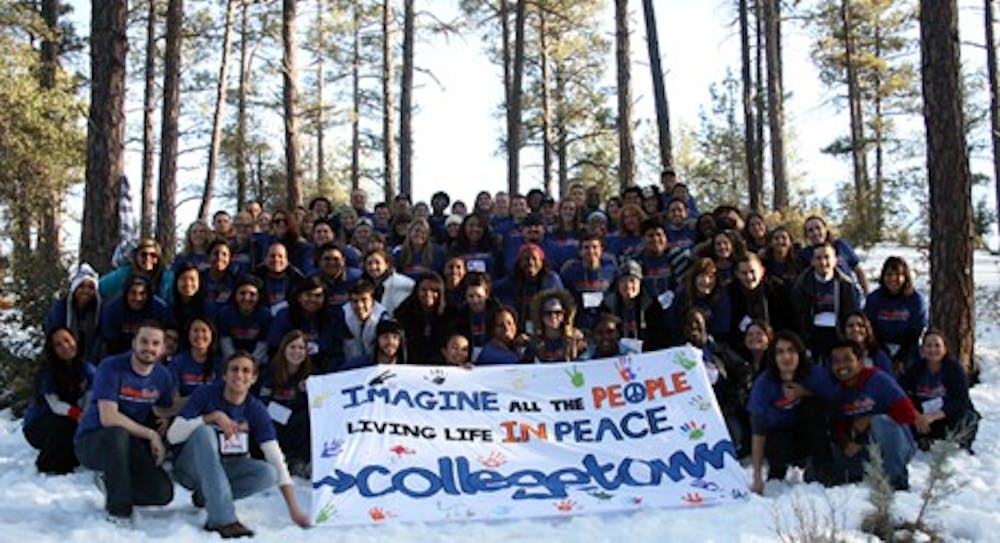In a sea of diverse faces on campus, one student group is promoting acceptance by empowering student leaders to build bridges between communities.
Collegetown at ASU strives to create awareness of social issues on campus by embracing diversity, raising awareness, encouraging communication and community support, Collegetown director Steve Russell said.
Last month, 63 members of the club went on a five-day retreat to Prescott to learn more about diversity issues and their impacts on society.
The club started on the Tempe campus in August 2009 and has held three retreats since then: one exclusively for Greek life students and two open to all club members. It promotes acceptance and awareness through the retreats.
“It was a great way to learn about myself and the students that I go to school with,” psychology and sociology junior Gregory Cook said.
Collegetown is modeled after the philosophy of Anytown at The Y, a YMCA initiative that offers leadership development programs to youth ages 12 and up. These programs focus on personal empowerment, building community and reducing prejudice.
The next Collegetown trip is tentatively scheduled for Aug. 8 to 13, but the group holds town hall meetings regularly on campus to discuss issues important to members. The next meeting is scheduled for April 14.
Cook first became involved in this type of program as a junior in high school and served as a counselor for an Anytown camp his senior year. January was Cook’s fifth time attending a retreat of this kind.
“There is always somebody new that you can learn from and somebody new that you can interact with,” Cook said.
Students spent the week in interactive workshops addressing issues in American society, Russell said in an e-mail. They focused on issues like racism on campus, access to education, economic status, sexual orientation and gender identity.
From around 7:30 a.m. to 11 p.m, students at the camp discussed these issues and shared their ideas and experiences.
“It was really incredible hearing everyone’s viewpoint on life and different issues,” design management junior Jacob Neumann said.
Neumann said he initially felt out of his comfort zone, but quickly created bonds with his peers on the trip.
“After a couple of hours of having just met these people, you are diving into what makes them tick,” he said.
Jaena Conover, microbiology junior and public relations director for the club, said Collegetown gives students a chance to meet new people and learn where they come from and what issues they have faced.
“It helped me to expand beyond the bubble,” Conover said. “There are a lot of issues on campus that I didn't know about.”
One issue that the conference addressed was the casual use of the phrases “That’s so gay” and “That’s retarded” by college students.
Cook said those phrases could be offensive.
“There have been people that have committed suicide over a simple comment,” he said.
Some of the more intense issues received mixed reactions from students and not everyone felt comfortable discussing them, Russell said.
The camp adopted the saying, “You may not always feel comfortable, but you will always be safe” to alleviate concern, he said.
When presented with issues like this, delegates at the camp were encouraged to try to come up with solutions and ways to inform the community through conversation and education.
“The first step on changing something is educating people about it,” Cook said. “Without dialogue, you can’t take that first step toward progressing.”
Transfer student Michael Bowler, founder of Epsilon Sigma Rho, a multi-cultural fraternity on campus, said the retreat motivated him to talk to others.
“The least I can do is speak up and put that little … seed of knowledge in their head,” he said. “It’s up to them what they want to do about it, but at least I said something.”
Bowler said his fraternity does not tolerate insensitive or discriminating comments. He makes a point to call out his brothers whenever they slip up.
Another issue the camp addresses is stereotypes. Jacob Neumann said the retreat taught him not to judge people based on their outward appearance and to view everyone on an equal playing field.
“It helped me understand that people are people,” Neumann said.
No matter their race, gender, sexual orientation or disability, Neumann said he now is more comfortable approaching others.
As one of the final activities on the trip, delegates were told to stand a few feet apart from one another and stare into each other’s eyes.
Neumann said this was a very powerful and intimate exercise.
“It’s incredible how much you learn about someone when you look into their eyes,” he said. “You get to see their purest form and you get a feeling of their soul.”
For Neumann, not only was the trip eye-opening, but it also encouraged him to make changes to his life.
He said he tries to make sure everyone’s needs are met because people deserve to feel like they matter. When people feel more confident in themselves, in turn they will be able to help others.
“I’ve been more actively promoting love and acceptance and it’s interesting to see how people are catching on,” he said.
Reach the reporter at jordan.frakes@asu.edu





